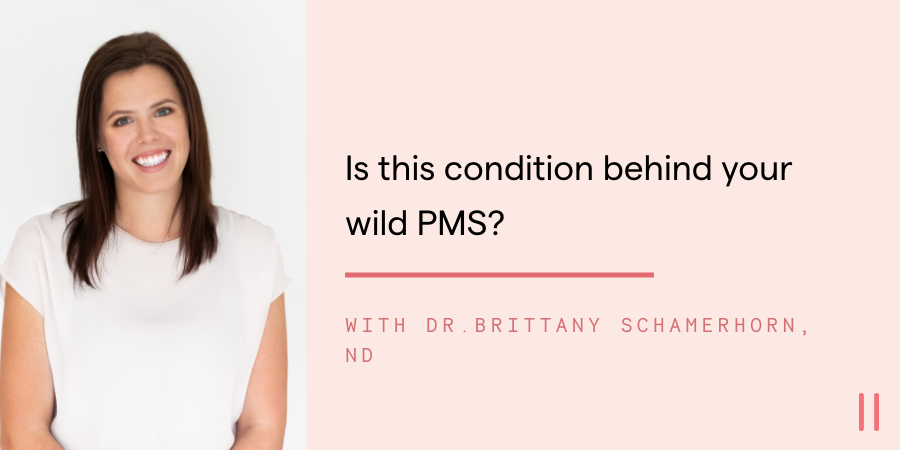Dr. Brittany Schamerhorn is a licensed Naturopathic Doctor located in Vancouver, BC with a clinical focus on women's health, stress management, fatigue, hormones, and gut health.
Have you ever thought that your PMS was way more pronounced than it should be? Felt that your mood shifts were dramatic, sometimes scary and related to your cycle? Ever heard of PMDD?
Premenstrual Dysphoric Disorder (PMDD) is a cyclical mood disorder with symptoms typically starting during the second half of the menstrual cycle and subsiding within a few days of menstruation.
How is PMDD different from PMS?
Premenstrual dysphoric disorder (PMDD) is a severe, sometimes disabling extension of PMS. PMDD causes extreme mood shifts that can significantly disrupt daily life. These conditions both occur prior to the menstrual cycle, with the symptoms of PMDD being much more significant and disruptive to daily life than PMS.
It is important to note that, while connected to the menstrual cycle, PMDD is not a hormone imbalance. It is a severe negative reaction in the brain to normal hormone changes.
How is it diagnosed?
PMDD is diagnosed clinically based on symptoms and their relation to the menstrual cycle. There is currently no blood, saliva or urine test that can diagnose PMDD.
Symptoms of PMDD typically begin about 1-2 weeks before menstruation and will end with the onset of menses. Many people with PMDD report these symptomatic transitions as drastic, with noticeable relief felt at the start of their period.
In order to be diagnosed with PMDD, you must meet certain symptom criteria. The IAMPD (International Association for Premenstrual Disorders) has a handy PMDD self-screening tool available, which you can fill out and then bring to a consultation with your physician.
How is it treated?
There isn’t one particular treatment option that works best for everyone who experiences PMDD. In fact, many find a combination of options provides the most comprehensive symptom relief. It is important to work with your healthcare team to determine which options may be best for you.
Some options may include:
- Lifestyle changes: including but not limited to focusing on sleep, stress management, nutrition and movement
- Nutrition-focused recommendations
- Medication—Birth Control Pills
- Though it may be useful for some, for those with progesterone-sensitive PMDD it may actually worsen symptoms. Currently, only pills that contain a combination of ethynyl estradiol and drosperidone (like Yaz) have shown benefit in trials for those with PMDD.
- Medication—Antidepressants
- Not all antidepressants have shown to be effective in managing PMDD. There is a select list that has proven to be effective and has the desired mechanism of action (for example - Prozac and Zoloft).
- When using antidepressants for PMDD they may be prescribed for continuous use or only during the luteal phase (second half of the menstrual cycle)
There are other treatment options that may also be offered based on an individual’s health history and condition. If you think you might be suffering from PMDD, reach out to your trusted health care practitioner to discuss your options.
Is there a link between PMDD & postpartum depression?
All pregnant women are at risk for postpartum depression, but you may have an increased risk if you have a history of depression or PMDD, so make sure you discuss this risk with your perinatal health team.
Any tips for managing PMDD symptoms within your relationships?
The mood changes that occur with PMDD can cause severe emotional, personal and professional distress making managing PMDD symptoms challenging and scary (especially when suicidal thoughts are involved). Ensuring that you have the right support, both within your interpersonal relationships and within your healthcare team, can make a significant difference.
For interpersonal relationships, it can be helpful for your partner to understand where you are in your menstrual cycle, and it is important that you feel comfortable communicating to them what you might need from them.
- - - - - - - -
This article is not intended to replace health care advice. Please speak with your healthcare provider if you suspect you may be suffering from PMDD to discuss symptom relief options.
You can learn more about Dr. Schamerhorn's work at www.drbrittanyschamerhorn.com or @drbritschamerhorn.nd on Instagram.

